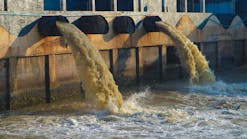WaterTech e-News Daily offers breaking news on West Virginia chemical spill
Readers of WaterTech e-News Daily are probably aware of the diverse topics we cover, including company announcements, developing news stories, blogs, special newsletters and online exclusive articles, to help you stay ahead of industry news and events.
Earlier this year we received ample feedback regarding coverage we provided on a chemical spill in West Virginia. For those who might have missed our developing news on this story or readers who would like a recap, here is a sample of our coverage.
Nine West Virginia counties ordered not to use water after chemical spill
January 10, 2014 — A chemical spill in Charleston’s Elk River has prompted the state and the federal government to declare a disaster, according to an article by U.S. News and World Report. A foaming agent used in the coal preparation process leaked from a tank at Freedom Industries and overran a containment area, reaching a nearby treatment plant. Residents in all or part of nine West Virginia counties were told to refrain from drinking, bathing in, cooking with or washing clothes in the tap water until further notice. The West Virginia National Guard will be distributing bottled water to emergency service agencies in the nine counties. The chemical, although not lethal, is harmful if swallowed and inhaled, causing eye and skin irritation.
Charleston to file lawsuit over water contamination crisis
January 23, 2014 — Charleston Mayor Danny Jones has announced that the city will be filing a lawsuit regarding the water contamination crisis that plagued nine West Virginia counties this month, according to an article by Metro News. “We are not sure who the defendants will be and we’re not sure who the plaintiffs will be,” said Jones. Up to 7,500 gallons of MCHM and PPH were leaked into the Elk River from a storage tank at Freedom Industries and entered the West Virginia American Water treatment plant two weeks ago. The crisis has cost the city $120,000 in lost tax revenue and, according to Jones, has hurt tourism. Damages to city businesses are likely enormous, but numbers are not yet available.
National Science Foundation issues $50,000 grant to West Virginia University
January 30, 2014 — The National Science Foundation has awarded a $50,000 grant to researchers at West Virginia University to study the effects of the Elk River chemical spill, according to an article by the Charleston Daily Mail. Using university funds, researchers began taking water samples immediately after the disaster, and with the grant, they can continue to analyze water from taps and rivers throughout the Kanawha Valley. A map of chemical exposure throughout the water distribution system to the public will eventually be released. “We want to determine short and long-term concentrations of these chemicals that were released in the river,” said Jennifer Weidhaas, an assistant professor of civil and environmental engineering at WVU and one of the project’s leaders. “This is one of the largest human-made environmental disasters in this century,” National Science Foundation Program Director William Cooper said. “In instances such as this, where the situation is developing and public health is involved, timing is everything.”
Senate hearing to examine West Virginia chemical spill
February 3, 2014— A U.S. Senate hearing tomorrow will address issues stemming from the recent chemical spill in West Virginia, according to a press release. The Environment and Public Works Subcommittee on Water and Wildlife hearing will examine the safety and security of drinking water supplies following the Charleston-area crisis. The hearing comes along with the introduction of the Chemical Safety and Drinking Water Protection Act.
AWWA and AMWA send letter to Senate on chemical spills
February 5, 2014 — The American Water Works Association (AWWA) and the Association of Metropolitan Water Agencies have sent a letter to the Senate Subcommittee on Water and Wildlife on how the U.S. Environmental Protection Agency (EPA) and states can help water systems better prepare for emergencies such as the recent chemical spill in West Virginia, according to a press release. Key points in the letter included the need for speedy notification of nearby water utilities of any incident that releases a chemical into water supplies and what a utility should do with contaminated water. According to the release, timely notification of what exactly was released can help a utility choose the appropriate response, from shutting down intakes, adjusting treatment, switching to alternate supplies and providing customers with accurate advisories.
Other coverage
In addition, we also published other news, comments and even a blog about this unfortunate event. On January 22, 2014 we published a news article about a Minnesota-based company, WaterFilters.NET, which planned to send 200-300 free refrigerator water filters to impacted customers, soliciting this reader comment and the below response from the company: “This is a great way to not only promote the company, but get the products out there. However, there aren’t many water filters on the market that can remove the chemicals that are in the water from this incident. Hopefully, the water filters that were sent can remove this, as these chemicals are still present in the water, even though they say it is safe to drink.” – Adam M.
Response from Mike Yanke of WaterFilters.NET: “To clarify one point, the water filters we provided are not designed to reduce MCHM, the chemical spilled in West Virginia’s drinking water supply. There is not enough information publicly available on MCHM for anyone to make that type of claim. However, replacing water filters is one of the last recovery steps a resident is instructed to complete when given the all clear in their area. This instruction is provided by both the CDC and West Virginia American Water.”
Of the decision to send filters, WaterFilters.NET CEO and founder Jamin Arvig states, “We have a good base of loyal customers in the West Virginia area, some of whom were living with ‘undrinkable’ drinking water for several weeks…Sending our customers in the area free refrigerator water filters was a small gesture we could make that synced perfectly with our core value to provide 360 degree service. Our hope is that this gesture will help to bring a little bit of normalcy back into the lives of our customers – and put a little bit of money back into their pocket.”
A regular blogger to WaterTechOnline.com, Dale Filhaber, president of Dataman Group Direct Mail and Telemarketing Lists, also weighed in on how water treatment dealers can lend some expertise: “Your dealership [needs] to be viewed as a resource, where your people balance educating a homeowner about legitimate water concerns – but not coming across as trying to scare them. The truth of the matter is that the chemicals that leaked into the water system in West Virginia were organic chemicals that had not been tested before – so dealers could honestly explain that this emergency took everyone, including the EPA, by surprise. From a marketing perspective, a dealer might provide bottled water to their own customers and suggest that after the emergency has been contained, that they would send someone over to inspect their system to ensure that their system continues to operate at the highest level. This…enhances the relationship with existing customers and provides an opportunity for additional products and services down the road.”
Dale’s blog also received some reader feedback. Jennifer S. wrote: “Great advice. Too many times I have walked into the home of a frantic homeowner concerned because another water treatment company told them not to drink or even bath in their water. I was able to educate the homeowner, point them in the direction of self-research and earn their trust.”


